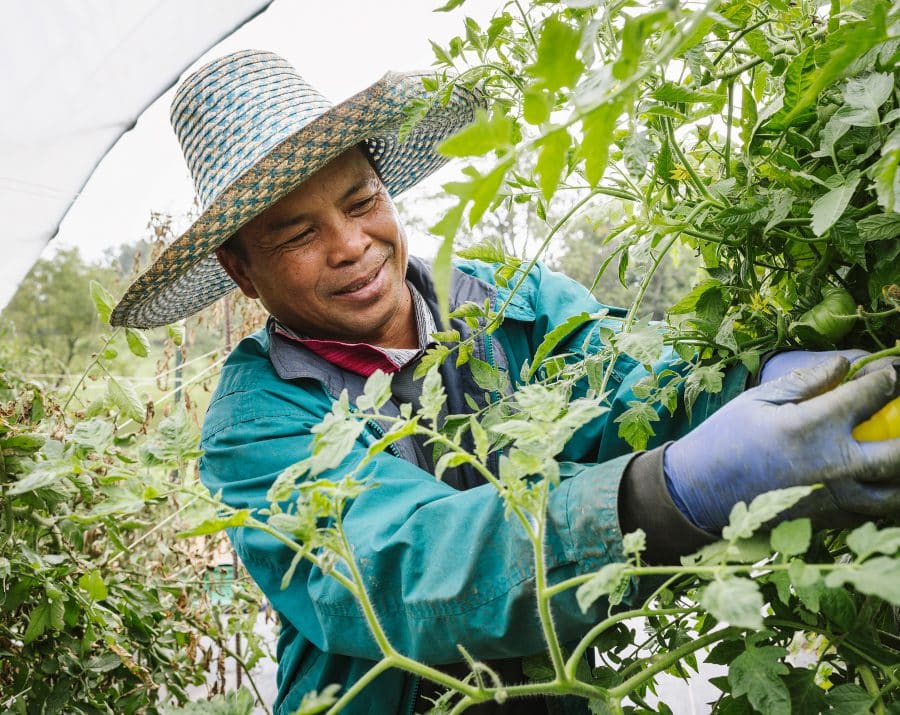Rooted in fair trade, we are a Northeast food distribution nonprofit that strives to bring transparency, sustainability, and equity to every aspect of how we do business.

The Founding
Red Tomato was started in 1997 by Michael Rozyne, a co-founder of Equal Exchange. Michael took a sabbatical from fair-trade coffee to explore what it would look like to apply the same concepts of fairness, transparency, and sustainability to produce sales from farms in the Northeastern U.S. While local food had yet to grab consumer and policy attention, it was clear that small and medium-sized growers were losing their ability to compete in an increasingly consolidated, global marketplace.

The Warehouse Years
At first Red Tomato ran a small warehouse and distribution operation, eventually moving from rented space in Equal Exchange’s warehouse to a larger facility in Canton, MA. Red Tomato was initially on the road to self reliance and profitability, increasing both our customer base and market opportunity for farmers. However, by the end of 2002 it became clear that a conventional wholesale model at our small scale could not compete with large scale distributors.

Becoming Non-Asset Based
In a risky, but carefully considered shift, we closed our warehouse, canceled our truck leases, and began to concentrate on managing logistics and marketing. This revised business model, or ‘Plan A’ as we call it around the office, positions Red Tomato as regional broker. The cost-effective solution of delivering whole truckloads of product to distribution centers which then delivered the ‘last mile’ has allowed us to bring price competitive local produce to market for over 15 years. This has allowed Red Tomato to focus on bringing awareness and increased returns to midsize growers in the wholesale market.

EcoApple
Developed by local farmers, scientific advisers, and in partnership with the IPM Institute of North America, we created the ecologically-based, farming certification program for Northeast fruit, with the first certified apples arriving on the market in August 2005. This certification gives customers an easy way to pick the freshest, locally grown apples while rewarding environmentally responsible and regionally appropriate growing practices.

Crystal Spring
Red Tomato’s offices moved from the former warehouse in Canton, MA to the Crystal Spring Earth Center in Plainville, MA. Our friendship with the Dominican Sisters of Peace, as well as the conservation land and active farm, have allowed Red Tomato to embrace our non-asset flexibility. They provide a tranquil backdrop during the chaos of produce season.

EcoPeach
Building on the success of our EcoApple program, the EcoPeach program began in 2011, with the first certified fruit arriving on store shelves in 2013. In addition to rewarding progressive growing methods, EcoPeach marketing has increased awareness of the production capacity and impeccable flavor of northeast peaches.

Return of the DSD
Plan A allows us to deliver truckloads of a single variety of produce. However, it doesn’t allow us the flexibility to delivery a wide range of produce and provide more personalized marketing and customer service. In 2014 we launched our direct store delivery (DSD) program, or as well call it, Plan B. We continue to manage these logistics without owning a warehouse or trucks, relying on aggregation and distribution partnerships with growers and other companies. While less efficient than full truckloads, this program allows us to interact more directly with store purchasing teams and the final consumer.

A New Kind of Market
In 2018 after our largest customer decided to take their business elsewhere our team went back to the planning board. It was clear that we needed to adapt to a rapidly consolidating market, and our peers in the good food movement were experiencing the same downward price pressure and challenges. We’re continually evaluating everything about our operation to determine how to best serve and advocate for mid-sized farmers in the wholesale market.
We Believe in Sustainability
Food has the ability to connect and empower communities. We know that sustainable growing and sustainable farms are the best way to create a solid future for our region’s farmers. We’re committed to connecting farmers and consumers through good produce. Our mission is to change the food system for the better.




